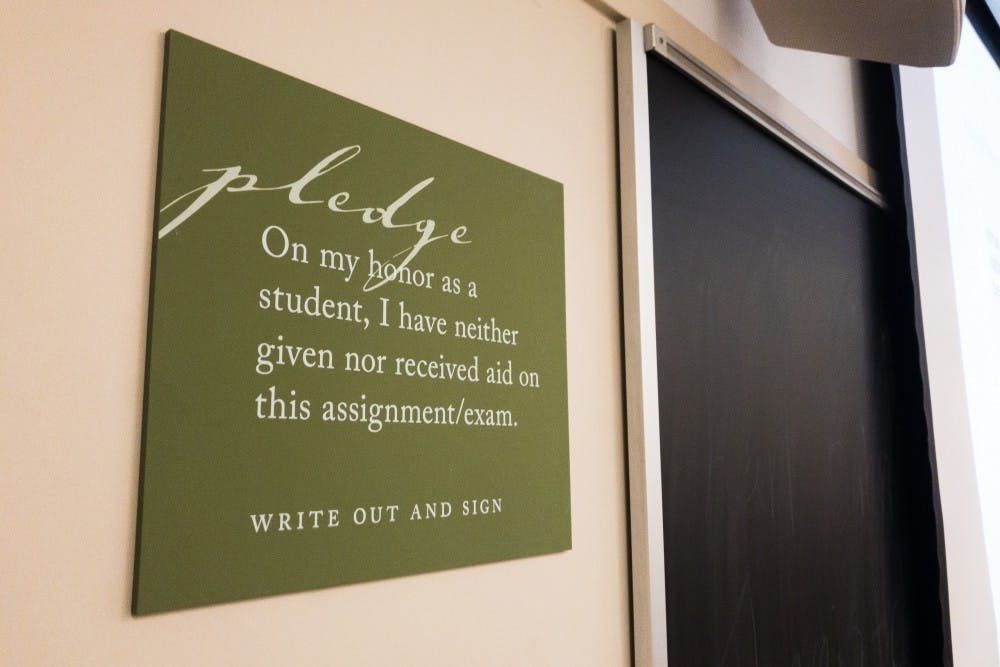This year, The Cavalier Daily Editorial Board endorses four candidates running for College of Arts and Sciences Honor representative — third-years Hamza Aziz and Nishita Ghanate, second-year Laura Howard and third-year Rachel Liesegang — and one candidate for School of Engineering and Applied Sciences Honor representative, first-year Alexander Church. Each of these candidates expressed strong support for the proposed multi-sanction system and they all incorporated transparency and rehabilitation into their platforms — ideals that will guide the Honor Committee as it looks to create a robust sanctioning system.
Aziz, current Vice Chair for Investigations, was endorsed by the previous Editorial Board, in part, for his desire to help the Committee implement a multi-sanction system. Sure enough, Aziz played a role in helping the Committee pass the multi-sanction constitution that is on the ballot this spring. Aziz made it clear that, as a member with executive experience on the Committee, he wants to leverage his new work to help ensure the successful implementation of the newly proposed system. On the issue of transparency, Aziz is committed to finding ways to release information from the Committee directly to students. Aziz cited decreasing buy-in from students as a major challenge for the Committee and hopes that the new multi-sanction constitution will be a turning point. We in turn hope that Aziz will capitalize on his experience and clear ideas to steer the Committee in the right direction.
Ghanate wants to ensure that the implementation of the multi-sanction Honor system will improve the efficacy and efficiency of the Committee. Ghanate understands the importance of utilizing the by-law amendment process to accomplish this goal. On the issues of transparency and student buy-in to the Honor system, Ghanate gave tangible solutions — she wants to expand the role of educators to inform all students about what the Committee does and hold an assembly each semester that all students may attend to give the Committee their opinions. Ghanate is confident she can help transform the Committee into a body that prioritizes restoration and rehabilitation, and we’re holding her to this vision.
Howard proposes bringing character evidence not only into the hearing to determine sanctioning but also into the hearing for guilt, ensuring students are recognized as people first. This is part of her larger mission to ensure that the Committee is primarily a rehabilitative body under the proposed multi-sanction system. Her views on ways to engage student buy-in are admirable, with proposals to bring traditionally marginalized students to the table through targeted partnerships and by encouraging underrepresented student groups to come to Committee meetings. Howard also aspires to increase transparency with students by hosting popular assemblies and conducting polling to solicit feedback on the Committee’s processes. We were heartened by the humanistic perspective she will bring to the Committee by advocating to ensure that stories are placed before sanctions — if elected, we’ll be watching to make sure she sticks to this commitment.
Current Honor Support Officer Liesegang proposed a practical plan for increasing student buy-in to the Honor system, including public sessions that students are encouraged to attend, admitting that the Committee currently does a poor job marketing existing forums to students. Her experience as a support officer gives her the hands-on experience interacting with accused students that will strengthen her ability to help implement the proposed multi-sanction constitution. Liesegang has plans to more actively incorporate marginalized students into Committee discussions by conducting more targeted outreach and creating informational booklets that disseminate important information. She hopes to emphasize the role that the Committee can play in including all students through targeted outreach and education. We agree that the Committee can be more transparent, and we’ll be watching to ensure Liesegang sticks to this plan.
Church also understands the issues surrounding the Committee’s lack of transparency and offered a fresh perspective that we think will be useful should the Committee’s proposed multi-sanction system pass. For starters, they have stated that first-years’ feedback should be solicited separately from that of Contracted Independent Organizations — groups whose leadership roles are typically held by upperclassmen. Additionally, they also realize that Engineering has higher rates of Honor offenses than most other schools. Instead of only reforming the sanctioning process, Church wants to focus on the reasons why Engineering students are more likely to be reported for Honor offenses and how systemic issues can be addressed by working proactively with professors and students. If elected to this position, Church would bring a much needed sense of creativity to an institution that is all too often stuck in its ways — we’re looking forward to seeing where that creativity takes them, if elected.
The Cavalier Daily Editorial Board is composed of the Executive Editor, the Editor-in-Chief, the two Opinion Editors, their Senior Associates and an Opinion Columnist. The board can be reached at eb@cavalierdaily.com.







